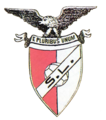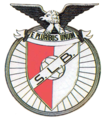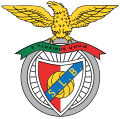This is an old revision of this page, as edited by SLBedit (talk | contribs) at 20:07, 29 August 2014 (Undid revision 623354672 by SLBedit (talk) It's being discussed.). The present address (URL) is a permanent link to this revision, which may differ significantly from the current revision.
Revision as of 20:07, 29 August 2014 by SLBedit (talk | contribs) (Undid revision 623354672 by SLBedit (talk) It's being discussed.)(diff) ← Previous revision | Latest revision (diff) | Newer revision → (diff) "Benfica" redirects here. For other uses, see Benfica (disambiguation). This article is about the football team. For other uses, see S.L. Benfica (disambiguation).Football club
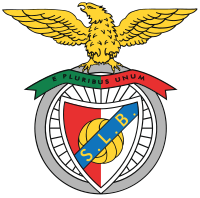 | |||
| Full name | Sport Lisboa e Benfica | ||
|---|---|---|---|
| Nickname(s) | Benfiquistas (supporters) As Águias (The Eagles) Os Encarnados (The Reds) O Glorioso (The Glorious One) | ||
| Founded | 28 February 1904 (120 years ago) (1904-02-28) as Sport Lisboa | ||
| Ground | Estádio da Luz | ||
| Capacity | 65,647 | ||
| President | Luís Filipe Vieira | ||
| Manager | Jorge Jesus | ||
| League | Primeira Liga | ||
| 2013–14 | Primeira Liga, 1st | ||
| Website | http://www.slbenfica.pt | ||
| |||
Sport Lisboa e Benfica ComC OM MHIH (Portuguese pronunciation: [spɔɾ liʒˈboɐ i bɐ̃ȷ̃ˈfikɐ]), commonly known as Benfica, or simply as SLB, is a Portuguese multi-sport club based in Lisbon. The club is best known for its professional football team that plays in the Primeira Liga, where they are the current champions.
Founded on 28 February 1904, Benfica is one of the Big Three (Três Grandes) clubs in Portugal, along with its long-standing rivals Sporting and Porto, who have never been relegated from the Portuguese league since its establishment in 1933. Benfica is the most supported Portuguese club and it is the European club with the biggest percentage of supporters in its own country (47%), having the most paying associates of any football club in the world. It is the twenty-sixth richest football club in terms of revenue, with an annual turnover of €109.2 million, and is evaluated as the thirty-eighth most valuable football brand in the world. The club's motto is "E pluribus unum" (Out of many, one) and its official anthem is "Ser Benfiquista". The team is nicknamed Águias (Eagles) or Encarnados (Reds), while its supporters are called Benfiquistas. Since 2003, Benfica has played its home games at the new Estádio da Luz.
Benfica is the most successful Portuguese club in terms of domestic titles (71), having won a total of 73 titles, and is the only club to have won all Portuguese competitions. The club has won a record of 33 Primeira Liga titles, a record of 25 Taça de Portugal (and 4 consecutively) — achieving a record of 10 doubles (dobradinhas) — a record of 5 Taça da Liga (and 4 consecutively), 5 Supertaça Cândido de Oliveira and 3 Campeonato de Portugal. In 2014, Benfica achieved an unprecedented treble (triplete) of Primeira Liga, Taça de Portugal and Taça da Liga. It also won the Supertaça, becoming the only club to have won all four domestic titles in a year. It is also the only club to have won the Primeira Liga and Taça da Liga, twice. Benfica became the first team in Portuguese league history to complete two 30-game seasons without defeats, namely the 1972–73 and 1977–78 seasons. In the former, Benfica achieved the largest difference of points ever between champions and runners-up (18 points) in a two-points-per-win system. Benfica also holds the European record for the most consecutive wins in domestic league (29), between 1971–72 and 1972–73, as well the record for the longest unbeaten run in Portuguese league (56), between 1976–77 and 1978–79.
Internationally, Benfica won the European Cup/UEFA Champions League in 1961 and 1962, a Portuguese feat. In addition, they were runners-up at the Intercontinental Cup in 1961 and 1962, at the European Cup in 1963, 1965, 1968, 1988 and 1990 (the only Portuguese club to have played three European Cup finals, moreover consecutively, and with the most finals played), and at the UEFA Cup/Europa League in 1983, 2013 and 2014 (the Portuguese club with the most UEFA Cup/Europa League finals played and the only with two played consecutively; and the club with the most victories, games played and goals scored in UEFA Europa League, being the only club to reach the final without any defeat). Benfica has reached 10 European finals, which ranks seventh all-time among UEFA clubs and is also a Portuguese record. In 2000, it was ranked twelfth in FIFA Club of the Century award. In 2009, it was ranked ninth in "Europe's Club of the Century" by IFFHS. In January 2014, it was ranked tenth in World Club Ranking by IFFHS. Benfica is currently ranked 5th in UEFA club rankings.
History
Early years (1904–1908)
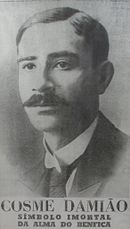

On 28 February 1904, a group of former students from the Real Casa Pia de Lisboa and members of Associação do Bem met at the back of the Farmácia Franco on Rua de Belém with the goal of forming a social and cultural football club that would be called Sport Lisboa. There were a total of 24 people who attended the meeting, including the eighteen years old co-founder and future soul of the club: Cosme Damião. During the meeting, José Rosa Rodrigues was appointed as the club's first president, along with Daniel Brito as secretary and Manuel Gourlade as treasurer. In this historic meeting it was defined that the colours of the club would be red (for bravery) and white (for peace), and the crest composed of an eagle, and the motto "E pluribus unum" (Out of many, one).
Despite important victories in the first few years, the club suffered due to poor operating conditions, namely the football field Terras do Desembargador. As a result, in 1907, eight players from the football team joined the then more wealthy Sporting, located across the city at Campo Grande. This major event started the rivalry between the two clubs.
On 13 September 1908, Sport Lisboa acquired by mutual agreement the Grupo Sport Benfica (founded on 26 July 1906 and renamed Sport Clube de Benfica in March 1908) and changed its name to Sport Lisboa e Benfica. Despite the merger of the two clubs, they continued their respective club operations. For Sport Lisboa they maintained the football team, the red and white shirt colours, the eagle as the symbol and "E pluribus unum" as the motto. For Grupo Sport Benfica they maintained the football field Campo da Feiteira, the main directors and the club's house. Under mutual agreement, both clubs determined that the foundation date of the newly formed club — Sport Lisboa e Benfica — should coincide with the foundation date of Sport Lisboa given that it was the most recognised club of the two in the merger and it was already quite popular in Lisbon due to its football merits. In regard to the new club's logo, a cycling wheel was added to the crest of Sport Lisboa to represent the most important sport of Grupo Sport Benfica. As for the new club's name, "Benfica" from "Grupo Sport Benfica" was merged with "Sport Lisboa" to form "Sport Lisboa e Benfica", which remains the formal full name. The club moved from the Belém area of Lisbon to the present-day Benfica area, which is a neighborhood located in the northern part of the city. Furthermore, the two entities of the new club had simultaneous associates which helped to stabilise operations and later increased the success of the merger.
First titles (1908–1950)
However, in the beginning, problems with the club's rented football field remained. In 1913, Benfica moved to Campo de Sete Rios but four years later the club was forced to move to Campo de Benfica due to a high rent. In 1925, Benfica built the Estádio das Amoreiras and this was the place where Benfica won its first national titles. Meanwhile, Benfica already had created the sections of roller hockey, field hockey, rugby, basketball, handball, billiards and volleyball. The Primeira Liga began in 1934 and, after losing the first edition, Benfica won the next three in a row (1935–36, 1936–37 and 1937–38), after winning ten Campeonato de Lisboa. In 1940, Benfica won its first Taça de Portugal. In 1941, Benfica moved to Estádio do Campo Grande. In cycling, it's worth to mention the importance of José Maria Nicolau, winner of Volta a Portugal in 1931 and 1934, who spread admiration for the club in the whole country at a time when television did not exist and there were few newspapers. Through the 1940s, Benfica won three Primeira Liga, in 1941–42, 1942–43 and 1944–45, and won four Taça de Portugal in 1940, 1943, 1944 and 1948. János Biri achieved the first double for the club in 1943.
Rise to dominance (1950–1960)

Benfica's first major international football success happened in 1950 when they won the Latin Cup, the predecessor of the European Cup, defeating Bordeaux at the Estádio Nacional, in Lisbon, with Ted Smith as manager. They reached another final of this competition in 1957 but lost to Real Madrid at the Santiago Bernabéu.
With Joaquim Ferreira Bogalho elected as president in 1952 and the arrival of manager Otto Glória in 1954, Benfica became more modernised and professional, and moved into the Estádio da Luz with an initial capacity of 40,000 spectators; later expanded to 70,000 in 1960.
During the 1950s, Benfica won three Primeira Liga (1950, '55 and '57) and six Taça de Portugal (1951, '52, '53, '55, '57 and '59), achieving the second double in 1955 and the third one in 1957. In addition to these successes, Benfica was able to end the decade with the basic foundations in place, enabling the club to enter the 1960s as one of the best teams in European football.
European Champions (1960–1970)


Led by manager Béla Guttmann, Benfica was the first team to break Real Madrid's dominance in European Champion Clubs' Cup by winning two consecutive European Cups, the first against Barcelona in 1961 at the Wankdorf Stadium and the second one against Real Madrid in 1962 at the Olympic Stadium.
Later on, Benfica reached another three European Cup finals but lost them to Milan in 1963 at the Wembley Stadium, to Internazionale in 1965 at the San Siro, and to Manchester United in 1968 again at the Wembley Stadium.
Many of Benfica's successes in this decade were achieved with all-time football great Eusébio, captain Mário Coluna, and other notable players. The 1960s were the best period of the club's history, in which Benfica won eight Primeira Liga (1960, '61, '63, '64, '65, '67, '68, and '69), three Taça de Portugal (1962, '64, and '69), and two European Champions Cup (1961 and '62). The fourth double was achieved in 1964 with Lajos Czeizler and the fifth one in 1969 with Otto Glória.
In 1968, Benfica was elected the European Team of the Year by France Football.
Dominance and decline (1970–1994)
During the 1970s, the team faded slightly from the European scene, but remained the main force of Portuguese football, winning six Primeira Liga (1971, '72, '73, '75, '76, and '77) and two Taça de Portugal (1970 and '72). Jimmy Hagan led the club to three Primeira Liga and one Taça de Portugal between 1970 and 1973, achieving the club's sixth double in 1972. Benfica also attracted Europe-wide attention when the team reached the semi-finals of the European Champions Cup, where the team was only narrowly defeated 1–0 on aggregate by Ajax of Johan Cruyff.
In 1972–73, Benfica became the first club in Portugal to last a whole season without defeat and won 28 matches — 23 consecutively — out of 30, and drew 2. In that year, Eusébio also became Europe's top scorer with 40 goals, in what was his penultimate season as a Benfica player. The team scored 101 goals, breaking the 100 goals mark for the second time in its history, and conceded 13 goals.
In the late 1970s, early 1980s, the club had some corporate management problems but the football team managed to keep up to its high standards again. In 1981, Lajos Baróti secured the seventh double for Benfica by winning the Primeira Liga and the Taça de Portugal. Later, under the guidance of Sven-Göran Eriksson, the club won two consecutive Primeira Liga in 1983 and 1984, one Taça de Portugal (1983), achieving the eighth double, and reached the final of the UEFA Cup in 1983 but lost on aggregate score to Anderlecht.
Following the completion of improvements to the football stadium, the board of Benfica decided to open the third level of the Estádio da Luz, which transformed it into the biggest football stadium in Europe and third largest in the world, with a seating capacity of 120,000 spectators (up to 135,000 in the days of 'standing behind the goals'). In 1986–87, John Moltimore won the Primeira Liga and Taça de Portugal, obtaining the ninth double for Benfica.
During the period from 1988 to 1994, Benfica made a huge financial investment in an effort to win another European Cup, reaching two European Cup finals in 1988 and 1990, but lost to PSV and Milan respectively. During this period, Benfica won three Primeira Liga (1989, '91, and '94) and one Taça de Portugal (1993).
Crisis (1994–2003)
Financial trouble dating back to the 1980s when Benfica completed the third tier (Terceiro Anel) of the Estádio da Luz and a long time dream of making Benfica again European Champion started to deteriorate the club finances. The rampant spending and a questionable signing policy which allowed for squads composed of well over 30 players, further aggravating the problem.
Consequently, the period from 1994 through 2003 was arguably the darkest in the history of Benfica. During this time, Benfica only won one Taça de Portugal in 1996 and had its lowest Primeira Liga finishing positions, such as sixth in 2000–01 and fourth in 2001–02. Benfica entered in default during the João Vale e Azevedo term of club presidency which further damaged the club finances and credibility, and nearly every year saw the hire of two or more managers, between 1994 and 2002, eleven managers shared the seat, Mário Wilson, three times no less.
It was during this period that Benfica paid €13 million for Simão Sabrosa, smashing the Portuguese transfer record, and decided to build the new Estádio da Luz on 28 September 2001, which would eventually cost €162 million.
Rebuilding years (2003–2009)

In 2003–04 season, with new president Luís Filipe Vieira and new manager José Antonio Camacho, Benfica won its 24th Taça de Portugal defeating José Mourinho's Porto in the final (2–1).
In 2004–05, Benfica won its 31st Portuguese League (the first in ten seasons) with Giovanni Trapattoni as manager. 2004 was marked by the death of the Hungarian player Miklós Fehér during a match against Vitória de Guimarães at the Estádio D. Afonso Henriques. The wake was held at the same stadium and then Benfica's president and the entire squad travelled to Hungary for the player's burial.
In 2005–06, Benfica won its fourth Supertaça against Vitória de Setúbal (1–0). In Europe, Benfica managed to reach the quarter-finals of Champions League defeating Manchester United 2–1 in the decisive group stage encounter, and then overcoming the European champions Liverpool 3–0 on aggregate. However, Benfica lost in the quarter-finals to the eventual Champions League winners Barcelona by an aggregate of 2–0, both goals coming during the second leg at Camp Nou.
In 2006–07, Benfica found themselves again facing Manchester United in a decisive Champions League group match in which the winner would advance. However, this time it was Manchester United who prevailed, gaining revenge in a 3–1 win.
On 20 August 2007, manager Camacho returned to Benfica on a two-year contract, following the sacking of Fernando Santos after one match in the Primeira Liga (a tie against the promoted Leixões), at a time when Benfica was facing a vital Champions League qualifying match against Copenhagen. A successful move since Benfica guaranteed a place in the Champions League after defeating Copenhagen 1–0, but then exited the competition at the group stage. The team was put into UEFA Cup where they lost to Getafe. Camacho resigned on 9 March 2008, then with interim manager Fernando Chalana the club failed to gain a top three finish in the league, placing the team in the UEFA Cup.
On 22 May 2008, former Valencia manager Quique Flores was appointed as Benfica's new manager where he won the club's first Taça da Liga defeating Sporting. The club was third in Primeira Liga getting a place in the Europa League.
On 8 June 2009, Quique Flores resigned as manager after agreeing to a friendly contractual termination. On 17 June, he was replaced by former Braga manager Jorge Jesus.
Recent years (2009–present)
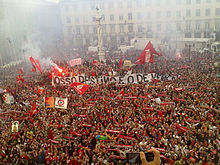
In 2009–10 season, Benfica had the highest average home attendance of 50,033 and the highest mark was 58,659 against Porto, a match won by Benfica 1–0. On 21 March 2010, Benfica beat Porto 3–0 in the Taça da Liga final and won its second consecutive trophy. In Europe, Benfica was drawn against Liverpool in the quarter-finals of the Europa League. At the Estádio da Luz, Benfica defeated Liverpool 2–1 but was eliminated after a 4–1 defeat at Anfield. On 9 May 2010, Benfica won its final league match against Rio Ave and became champion of the 2009–10 Primeira Liga, conquering its 32nd Primeira Liga title and securing a direct entry into the 2010–11 UEFA Champions League. Óscar Cardozo finished top scorer of the Primeira Liga with 26 goals.
In 2010–11, after participating in the Champions League, Benfica moved to Europa League and progressed to its first European semi-final in eighteen years. The team lost on the away goals rule after a 2–2 result against Braga. On 23 April 2011, Benfica won the Taça da Liga final against Paços de Ferreira, clinching its third consecutive title in this competition. The club finished second in Primeira Liga.
In 2011–12, Benfica reached the quarter-finals of the Champions League, being eliminated by eventual winners Chelsea; won its fourth consecutive Taça da Liga, and was second in Primeira Liga qualifying directly to the 2012–13 UEFA Champions League. Óscar Cardozo was the top scorer of Primeira Liga for the second time, with 20 goals. In 2012, Benfica was ranked eight in World Club Ranking by IFFHS.
In 2012–13, Benfica returned to a European final, after coming third in its Champions League group, Benfica reached the Final of the Europa League but lost 2–1 to the 2012 European champions Chelsea. It was the ninth European final overall for Benfica and the first since the 1990 European Cup Final. Domestically, Benfica was second in Primeira Liga despite leading until the penultimate day. They reached the semi-finals of the Taça da Liga but lost in penalty shootout against the eventual winners Braga. They reached the Final of the Taça de Portugal but suffered a defeat (1–2) against Vitória de Guimarães with the first of the two goals suffered being an offside goal. Benfica had the highest average attendance (42,366) of Primeira Liga.
The 2013–14 season was one of the best in the club's history as Benfica conquered its 33rd champion title, won its fifth Taça da Liga without conceding any goal (record), reached the Europa League final for a second consecutive time, without any defeat (record), and won its 25th Taça de Portugal, achieving the tenth Portuguese double. On 18 May 2014, Jorge Jesus achieved an historic treble for Benfica and a unique one in Portuguese football. Benfica completed the season unbeaten at home in all five competitions, and had the best defence of all European leagues with 18 goals conceded. Lima was the top goalscorer with 21 goals (14 in the league). In terms of average home attendance, the club improved the previous number to 43,613.
Benfica started the 2014–15 season by winning the Supertaça Cândido de Oliveira, thus establishing a new Portuguese record of all four domestic titles won in a year. In August 2014, RSSSF ranked Benfica as the best team in UEFA competitions over the last 5 years, fourth in the last 10 years, and seventh in all-time ranking.
Support

The supporters (adeptos) of Benfica are known as Benfiquistas. They call the club o Glorioso (the Glorious One) hence the popular chant "Glorioso SLB".
Due to the success and popularity of its football team and other sports such as athletics, basketball, cycling, futsal, roller hockey and others, Benfica has built the biggest fan base in Portugal with an estimated 5,8 million fans (historically 6 million), and one of the biggest in the world with an estimated 14 million fans spread across different countries such as Andorra, Angola, Australia, Belgium, Brazil, Canada, Cape Verde, Croatia, France, Germany, Guinea-Bissau, Japan, Luxembourg, Macau, Malaysia, Mozambique, Netherlands, Switzerland, Timor-Leste, United Kingdom and the United States.
Since 2006, Benfica holds the Guinness World Record for the football club with the most paying associates with a total of 235,000, leaving behind Bayern Munich (223,985) and Barcelona (177,246). It is the European club with the biggest percentage of supporters in its own country (47%).
The club has the twenty-fourth highest average attendance of European football clubs, which is the highest in Portugal.
Rivalries
Derby de Lisboa

The Derby da Capital is the most important football derby in Portugal. It is played between the Lisbon teams of Benfica and Sporting. The rivalry originated back in 1907 when eight Benfica players moved to Sporting. The match is followed worldwide, being transmitted live especially in the former Portuguese colonies.
O Clássico
Main article: O ClássicoThe rivalry between Benfica and F.C. Porto comes about as Lisbon and Porto are the two largest Portuguese cities, respectively. These clubs are two of the wealthiest, currently the most successful and influential football teams in Portugal.
Records and statistics
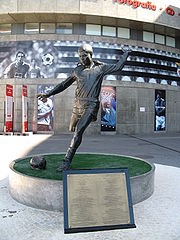
Nené has the most official appearances overall (575) and Luisão has the most appearances in European matches (108). Eusébio is the all-time top goalscorer with 474 goals in 440 matches, while José Águas places second with 374 goals in 384 matches, followed by Nené with 360 goals in 575 matches.
Benfica was the first club to win the Primeira Liga without a defeat during the 1972–73 season and also the first to do it twice in 1977–78. The club holds the record of 56 matches in Primeira Liga without a defeat from 24 October 1976 to 1 September 1978.
In 1972–73, Benfica won 23 matches in a row and set the Portuguese league record for most consecutive wins. The team finished the season with 58 points in 30 matches, the most ever obtained (96.7% efficiency), and achieved the largest difference ever between champions and runners-up (18 points), in a 2 points per win system.
The club also holds the Portuguese records of 2 consecutive European Champions' Cups, 10 European finals, 33 Primeira Liga, 25 Taça de Portugal, 5 Taça da Liga, 10 doubles (excluding the 2 league and league cup doubles) and a unique domestic treble (league, cup and league cup).
Benfica holds the European record of 29 consecutive wins in domestic league, between 1971–72 and 1972–73.
In UEFA Europa League, Benfica has the most goals and wins, and is the only club to have reached two finals consecutively, the most recent without any defeat, which is a new record.
Crest and shirt


Benfica crest is composed of an eagle — as a symbol of independence, authority and dignity — positioned on top of a shield with the club's colours red and white, the motto "E pluribus unum" (Out of many, one), and the acronym "SLB" for "Sport Lisboa e Benfica" over a football; everything superimposed on a bicycle wheel, which was taken from the Grupo Sport Benfica.
Emblem evolution
The origin of the crest goes back to 1908 when Sport Lisboa was merged with Grupo Sport Benfica. The crest was modified in 1930 and 1999, the last modification was essentially the repositioning of the eagle. Since 2008, the club has been using a commemorative crest about important football titles in its history by adding stars on top of it.
Kit manufacturers and shirt sponsors
| Period | Kit manufacturer | Shirt partner |
|---|---|---|
| 1974–1985 | Adidas | None |
| 1985–1986 | Shell | |
| 1986–1989 | Fnac | |
| 1989–1992 | Hummel | |
| 1992–1994 | Casino Estoril | |
| 1994–1996 | Olympic | Parmalat |
| 1996–1997 | Telecel | |
| 1997–2000 | Adidas | |
| 2000–2001 | Netc | |
| 2001–2005 | Vodafone | |
| 2005–2008 | PT | |
| 2008–2012 | TMN | |
| 2012–2021 | MEO |
Grounds
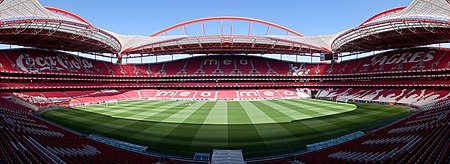
From 1954 to 2003, Benfica played at the old Estádio da Luz, the largest stadium in Europe and the third largest in the world in terms of capacity at the time. It was demolished and the new stadium was built with a capacity of 65,647 spectators.
Since 2003, Benfica has played at the Estádio da Luz (officially named Estádio do Sport Lisboa e Benfica), located in Lisbon, Portugal.
The new Estádio da Luz hosted several matches of the UEFA Euro 2004, including the final match. On 20 March 2012, the stadium was designated the venue for the 2014 UEFA Champions League Final.
Museum
The Museu Benfica – Cosme Damião is located near the stadium.
Honours
See also: List of S.L. Benfica honours and S.L. Benfica in European footballDomestic competitions
- Winners (33) (record): 1935–36, 1936–37, 1937–38, 1941–42, 1942–43, 1944–45, 1949–50, 1954–55, 1956–57, 1959–60, 1960–61, 1962–63, 1963–64, 1964–65, 1966–67, 1967–68, 1968–69, 1970–71, 1971–72, 1972–73, 1974–75, 1975–76, 1976–77, 1980–81, 1982–83, 1983–84, 1986–87, 1988–89, 1990–91, 1993–94, 2004–05, 2009–10, 2013–14
- Runners-up (27): 1943–44, 1945–46, 1946–47, 1947–48, 1948–49, 1951–52, 1952–53, 1955–56, 1958–59, 1965–66, 1969–70, 1973–74, 1977–78, 1978–79, 1981–82, 1985–86, 1987–88, 1989–90, 1991–92, 1992–93, 1995–96, 1997–98, 2002–03, 2003–04, 2010–11, 2011–12, 2012–13
- Winners (25) (record): 1939–40, 1942–43, 1943–44, 1948–49, 1950–51, 1951–52, 1952–53, 1954–55, 1956–57, 1958–59, 1961–62, 1963–64, 1968–69, 1969–70, 1971–72, 1979–80, 1980–81, 1982–83, 1984–85, 1985–86, 1986–87, 1992–93, 1995–96, 2003–04, 2013–14
- Runners-up (10): 1938–39, 1957–58, 1964–65, 1970–71, 1973–74, 1974–75, 1988–89, 1996–97, 2004–05, 2012–13
- Winners (3): 1929–30, 1930–31, 1934–35
- Runners-up (1): 1937–38
European competitions
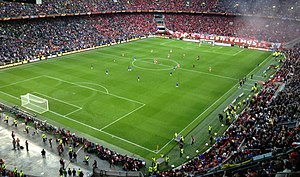
Worldwide competitions
Players
Main article: List of S.L. Benfica players For a list of all former and current S.L. Benfica players with a Misplaced Pages article, see Category:S.L. Benfica footballers. Further information: 2014–15 S.L. Benfica season § Squad informationCurrent squad
- As of 22 August 2014.
Note: Flags indicate national team as defined under FIFA eligibility rules; some limited exceptions apply. Players may hold more than one non-FIFA nationality.
|
|
Out on loan
Note: Flags indicate national team as defined under FIFA eligibility rules; some limited exceptions apply. Players may hold more than one non-FIFA nationality.
|
|
Retired numbers
See also: Retired numbers in association football| No. | Player | Nationality | Position | Benfica debut | Last match |
|---|---|---|---|---|---|
| 29 | Miklós Fehér | Forward | 24 August 2002 | 25 January 2004 |
In 2004–05 season, Luís Filipe Vieira said no player will wear the number 29 shirt since the club decided to retire it in memory of Miklós Fehér.
Personnel
Current technical staff
See also: List of S.L. Benfica managers
| Position | Name |
|---|---|
| Head coach | Jorge Jesus |
| Assistant coach | Raúl José Miguel Quaresma Minervino Pietra |
| Goalkeeping coach | Hugo Oliveira |
| Fitness coach | Mário Monteiro |
| Director of football | Lourenço Coelho |
| B team coach | Hélder Cristóvão |
Last updated: 16 June 2013
Source: S.L. Benfica
Management
See also: List of S.L. Benfica presidents
| Position | Name |
|---|---|
| President | Luís Filipe Vieira |
| Vice-president | Rui Cunha Rui Gomes da Silva Domingos Almeida Lima José Eduardo Moniz Nuno Gaioso João Varandas Fernandes Alcino António Sílvio Cérvan |
| President of general assembly | Luís Nazaré |
| President of fiscal board | Nuno Afonso Henriques |
Last updated: 30 July 2014
Source: S.L. Benfica
Finances
| Traded as | Euronext: SLBEN |
|---|---|
| Revenue | |
| Operating income | |
| Net income | |
| Total assets | |
| Total equity |
Sport Lisboa e Benfica – Futebol, SAD was created by João Vale e Azevedo on 10 February 2000 with an initial equity of €75 million. There were five major reasons for creating an autonomous entity to manage the professional football team:
- Participation in professional competitions, both domestic or international.
- Development of football players.
- Exploration of TV rights, both on closed or open channels.
- Management of image rights of the players.
- Exploitation of the Benfica brand by the professional football team.
Benfica SAD entered the PSI-20 on 21 May 2007 with an initial stock value of €5 on 15,000,001 shares. On 15 June 2007, Joe Berardo launched an initial public offering of Benfica SAD for €3.50 a share.
On 23 December 2009, Benfica SAD, after a vote of its members, decided to increase the equity to €115 million by absorbing Benfica Estádio, SA. The initial equity of €75 million was by then completely lost, when the SAD was in balance sheet insolvency. This increase in equity means that 7,999,999 more shares are on the stock market. Benfica valued them at €5 each. They were admitted to the stock market on 14 June 2012.
In Portugal, companies in the stock market index are obligated to provide information to its shareholders and CMVM and every semester a more detailed report is published.
In 2009–10, Benfica SAD posted losses of €11.3 million, an improvement from the nearly €30 million loss in 2008–09. In 2010–11, Benfica continued in the red, posting losses of €7.6 million, even after the sale of David Luiz to Chelsea.
In 2011–12, SAD posted losses of €11.7 million, after earning approximately €21 million from the Champions League and selling Fábio Coentrão and Roberto for approximately €38 million.
In 2012–13, SAD posted losses of €10.3 million and generated a club record €51.5 million with the sales of Javi García and Axel Witsel for a total revenue of more than €145 million.
See also
Reserve team
Indoor arenas
Media
Other
- Deloitte Football Money League
- European Club Association
- List of unrelegated association football clubs
References
- "Decorations and Honorary Orders". S.L. Benfica. Retrieved 10 May 2014.
- ^ "Concentration of people supporting the most popular club" (PDF). UEFA. 17 April 2014. p. 41. Retrieved 27 May 2014.
- ^ "Most widely supported football club". Guinness World Records. 9 November 2006. Retrieved 5 January 2013.
- ^ "SL Benfica é o Clube com mais Sócios do Mundo" (in Portuguese). S.L. Benfica. 16 February 2014. Retrieved 16 February 2014.
{{cite web}}: Unknown parameter|trans_title=ignored (|trans-title=suggested) (help) - ^ "Benfica é o clube com mais sócios no mundo" (in Portuguese). O Jogo. 23 August 2012. Retrieved 7 January 2014.
{{cite news}}: Unknown parameter|trans_title=ignored (|trans-title=suggested) (help) - "Deloitte Football Money League 2014". Deloitte. January 2014. Retrieved 27 May 2014.
- "The Brand Finance Football 50 2014 - The world's most valuable football brands". Brand Finance. May 2014. Retrieved 26 May 2014.
- Weiss, Jessica (27 March 2012). "Showing Support in Song". The New York Times. Retrieved 25 December 2013.
- ^ "Benfica seal 33rd Portuguese title". UEFA. 20 April 2014. Retrieved 20 May 2014.
- ^ "Liga Portugal" (in Portuguese). LigaPortugal.pt. 2014. Retrieved 2 January 2014.
{{cite web}}: Unknown parameter|trans_title=ignored (|trans-title=suggested) (help) - "Benfica lift cup to seal historic treble". UEFA. 18 May 2014. Retrieved 20 May 2014.
- "Benfica conquista Taça e consegue o triplete em Portugal" (in Portuguese). FIFA. 18 May 2014. Retrieved 18 May 2014.
{{cite news}}: Unknown parameter|trans_title=ignored (|trans-title=suggested) (help) - ^ "Benfica seal Super Cup win on penalties". UEFA. 11 August 2014. Retrieved 11 August 2014.
- ^ "Benfica 0-0 Rio Ave (3-2 on penalties): Portuguese champions win another trophy". Goal. 11 August 2014. Retrieved 11 August 2014.
- ^ Stokkermans, Karel (23 December 2013). "Unbeaten during a League Season". RSSSF. Retrieved 1 January 2014.
- ^ Martins, Paulo (27 July 2004). "SL Benfica's series of 56 matches unbeaten in the I Divisão". RSSSF. Retrieved 1 January 2014.
- ^ Viegas, João (1 September 2013). "Dragões voltam a falhar o recorde do Benfica" (in Portuguese). Record. Retrieved 1 January 2014.
{{cite web}}: Unknown parameter|trans_title=ignored (|trans-title=suggested) (help) - "Europa League: 10-man Benfica fends off Juventus, returns to final". Sports Illustrated. 1 May 2014. Retrieved 27 May 2014.
- "The FIFA Club of the Century" (PDF). FIFA. Archived from the original (PDF) on 23 April 2007. Retrieved 28 May 2014.
The FIFA Club of the Century was voted exclusively by the readers of the bi-monthly FIFA Magazine
- "Europe's Club of the Century". IFFHS. 10 September 2009. Archived from the original on 5 November 2013. Retrieved 28 May 2014.
- "IFFHS: Benfica 10.º melhor clube do Mundo em 2013" (in Portuguese). A Bola. 9 January 2014. Archived from the original on 9 January 2014. Retrieved 9 January 2014.
{{cite news}}: Unknown parameter|trans_title=ignored (|trans-title=suggested) (help) - Barreira, Miguel (9 January 2014). "Benfica no 10.º lugar do ranking dos melhores do Mundo". Record. Retrieved 10 January 2014.
{{cite news}}: Unknown parameter|trans_title=ignored (|trans-title=suggested) (help) - "Member associations - UEFA rankings - Club coefficients". UEFA. 26 May 2014. Retrieved 26 May 2014.
- "Foundation". S.L. Benfica. Archived from the original on 1 January 2014. Retrieved 31 December 2013.
- Silveira, João (30 August 2011). "História Benfica" (in Portuguese). zerozero. Retrieved 2 January 2014.
{{cite web}}: Unknown parameter|trans_title=ignored (|trans-title=suggested) (help) - "Classic club: Eagles ready to take flight". FIFA. 2014. Retrieved 7 January 2014.
- "Benfica e Barcelona assinam transferência de Simão" (in Portuguese). Record. 27 June 2001. Retrieved 31 October 2012.
{{cite news}}: Unknown parameter|trans_title=ignored (|trans-title=suggested) (help) - "Estádio que tinha "preço máximo fixo garantido" de 23 milhões de contos e acabou a custar 32 milhões, mas mesmo assim "custou menos do que o orçamentado"" (in Portuguese). Retrieved 31 October 2012.
{{cite web}}: Unknown parameter|trans_title=ignored (|trans-title=suggested) (help) - Silveira, João (24 October 2012). "Estádio da Luz: a Catedral" (in Portuguese). zerozero. Retrieved 31 October 2012.
{{cite web}}: Unknown parameter|trans_title=ignored (|trans-title=suggested) (help) - Paulo, Isabel (19 May 2010). "Benfica é o 10.º clube europeu com maiores assistências" (in Portuguese). Expresso. Retrieved 6 August 2012.
{{cite news}}: Unknown parameter|trans_title=ignored (|trans-title=suggested) (help) - "Benfica eliminado em Liverpool". Visão. 8 April 2010. Retrieved 6 August 2012.
{{cite news}}: Unknown parameter|trans_title=ignored (|trans-title=suggested) (help) - "Futebol: Benfica campeão – Equipa vai desfilar de autocarro até ao Marquês de Pombal" (in Portuguese). Agência Lusa. 9 May 2010. Retrieved 6 August 2012.
{{cite news}}: Unknown parameter|trans_title=ignored (|trans-title=suggested) (help) - "Benfica: Cardozo foi o melhor marcador da Liga Europa" (in Portuguese). Maisfutebol. 9 May 2010. Retrieved 6 August 2012.
{{cite news}}: Unknown parameter|trans_title=ignored (|trans-title=suggested) (help) - Santigao, Eduardo; Agre, João (20 April 2011). "Benfica vence Taça da Liga". SAPO Notícias. Retrieved 6 August 2012.
{{cite news}}: Unknown parameter|trans_title=ignored (|trans-title=suggested) (help) - "Benfica eliminado da Champions pelo Chelsea após derrota em Londres" (in Portuguese). Jornal de Notícias. 4 April 2012. Retrieved 6 August 2012.
{{cite news}}: Unknown parameter|trans_title=ignored (|trans-title=suggested) (help) - "Benfica vence Taça da Liga pela quarta vez" (in Portuguese). Agência Lusa. 14 April 2012. Retrieved 6 August 2012.
{{cite news}}: Unknown parameter|trans_title=ignored (|trans-title=suggested) (help) - "Cardozo foi o melhor marcador" (in Portuguese). SOL. 12 May 2012. Retrieved 6 August 2012.
{{cite news}}: Unknown parameter|trans_title=ignored (|trans-title=suggested) (help) - Calado, Paulo (12 January 2012). "Encarnados são a 8.ª melhor equipa do Mundo" (in Portuguese). Record. Retrieved 10 January 2014.
{{cite news}}: Unknown parameter|trans_title=ignored (|trans-title=suggested) (help) - Vaza, Marco; Sousa, Hugo (2 May 2013). "A primeira final europeia de Jorge Jesus será a nona para o Benfica" (in Portuguese). Público. Retrieved 7 January 2014.
{{cite news}}: Unknown parameter|trans_title=ignored (|trans-title=suggested) (help) - Taylor, Louise (15 May 2013). "Jorge Jesus hopes to resurrect Benfica and break European curse". The Guardian. Retrieved 7 January 2014.
- Kane, Desmond (15 May 2013). "Europa League – Ivanovic heads Chelsea to last-gasp glory against Benfica". Eurosport UK. Retrieved 27 May 2013.
- Bailey, Paul (20 May 2013). "Porto claim Portuguese title after outrageous penalty decision". GiveMeSport. Retrieved 6 January 2013.
- "Benfica's Portuguese Cup defeat caps disastrous finale". BBC Sport. 26 May 2013. Retrieved 2 January 2014.
- de Beer, Brendan (24 May 2013). "Vitoria crowned Portuguese Cup champions". The Portugal News. Retrieved 6 January 2014.
- "Attendances Portugal average (2012–13)". European Football Statistics. Retrieved 21 May 2014.
- "Benfica novo campeão da Liga Zon Sagres" (in Portuguese). Liga Portugal. 20 April 2014. Retrieved 22 April 2014.
{{cite news}}: Unknown parameter|trans_title=ignored (|trans-title=suggested) (help) - "Benfica beat Olhanense to take title". FIFA. 20 April 2014. Retrieved 23 April 2014.
- "Benfica venceu esta competição sem sofrer um golo" (in Portuguese). 7 May 2014. Retrieved 8 May 2014.
{{cite web}}: Unknown parameter|trans_title=ignored (|trans-title=suggested) (help) - ^ "Benfica é rei sem coroa da competição" (in Portuguese). Record. 14 May 2014. Retrieved 30 May 2014.
{{cite web}}: Unknown parameter|trans_title=ignored (|trans-title=suggested) (help) - Gardner, Paul (15 May 2014). "Brazen goalkeeper cheating helps Sevilla win Europa League". Soccer America. Retrieved 17 May 2014.
- "Portuguese League Cup boosts Benfica". UEFA. 7 May 2014. Retrieved 8 May 2014.
- "Benfica proud of mammoth Portuguese haul". UEFA. 19 May 2014. Retrieved 20 May 2014.
- "Benfica complete unbeaten home campaign". UEFA. 5 May 2014. Retrieved 20 May 2014.
- "Italianos destacam defesa menos batida do Benfica" (in Portuguese). A Bola. 20 May 2014. Retrieved 20 May 2014.
{{cite news}}: Unknown parameter|trans_title=ignored (|trans-title=suggested) (help) - ^ "Primeira Liga 2013/2014 » Attendance » Home matches". Worldfootball. May 2014. Retrieved 3 June 2014.
- "European Football Clubs Rankings". RSSSF. 26 August 2014. Retrieved 29 August 2014.
- "As verdades deturpadas da história do Benfica" (PDF) (in Portuguese). S.L. Benfica. Retrieved 7 January 2014.
{{cite web}}: Unknown parameter|trans_title=ignored (|trans-title=suggested) (help) - Queirós, Eugénio (10 September 2012). "Benfica líder: 5,8 milhões de adeptos" (in Portuguese). Record. Retrieved 7 January 2013.
{{cite news}}: Unknown parameter|trans_title=ignored (|trans-title=suggested) (help) - "Benfica à escala mundial" (in Portuguese). Retrieved 28 May 2014.
{{cite web}}: Unknown parameter|trans_title=ignored (|trans-title=suggested) (help) - "Symbols". S.L. Benfica. 2014. Archived from the original on 6 December 2013. Retrieved 7 January 2014.
- "Benfica não vai alterar emblema" (in Portuguese). S.L. Benfica. 17 December 2007. Archived from the original on 27 April 2010. Retrieved 2 September 2011.
{{cite news}}: Unknown parameter|trans_title=ignored (|trans-title=suggested) (help) - "Benfica vai ter 3 estrelas no equipamento" (in Portuguese). Maisfutebol. 1 March 2008. Retrieved 6 August 2012.
{{cite web}}: Unknown parameter|trans_title=ignored (|trans-title=suggested) (help) - "Benfica: Nomes antigos" (in Portuguese). zerozero. 2 September 2011. Retrieved 2 September 2011.
{{cite web}}: Unknown parameter|trans_title=ignored (|trans-title=suggested) (help) - "Benfica shirts". Benfica-Portugal-Shirts.de. 7 June 2008. Retrieved 7 January 2014.
- "Estádio da Luz é o palco da final em 2014 – Liga dos Campeões" (in Portuguese). Record. 20 March 2012. Retrieved 7 August 2012.
{{cite news}}: Unknown parameter|trans_title=ignored (|trans-title=suggested) (help) - "Plantel Principal" (in Portuguese). 2014. Retrieved 7 January 2014.
{{cite web}}: Unknown parameter|trans_title=ignored (|trans-title=suggested) (help) - "El Benfica retirará el dorsal número 29 en recuerdo a Miklos Feher" (in Spanish). Libertad Digital. 27 January 2001. Retrieved 28 May 2014.
{{cite web}}: Unknown parameter|trans_title=ignored (|trans-title=suggested) (help) - "Venda de terrenos do Benfica explica saneamento e opção-SAD" (in Portuguese). Record. 11 February 2000. Retrieved 9 August 2012.
{{cite news}}: Unknown parameter|trans_title=ignored (|trans-title=suggested) (help) - "Benfica SAD". S.L. Benfica. 21 May 2007. Retrieved 9 August 2012.
- ^ "Prospecto de admissão à negociação ao Euronext" (PDF) (in Portuguese). CMVM. 6 June 2012. Retrieved 16 August 2012.
{{cite web}}: Unknown parameter|trans_title=ignored (|trans-title=suggested) (help) - José, Luís (21 May 2007). "Benfica entra na bolsa com mercado em recuperação financeira" (in Portuguese). Jornal de Negócios. Retrieved 7 August 2012.
{{cite news}}: Unknown parameter|trans_title=ignored (|trans-title=suggested) (help) - "Especial OPA de Joe Berardo sobre a Benfica SAD" (in Portuguese). Agência Financeira. 21 June 2007. Archived from the original on 18 May 2013. Retrieved 7 August 2012.
{{cite news}}: Unknown parameter|trans_title=ignored (|trans-title=suggested) (help) - "Relatório de Contas do 1º semestres de 2011–12" (PDF) (in Portuguese). CMVM. 1 March 2012. Retrieved 7 August 2012.
{{cite web}}: Unknown parameter|trans_title=ignored (|trans-title=suggested) (help) - "Relatório e Contas Consolidado e Individual 2010/2011 após aprovação em Assembleia Geral" (PDF) (in Portuguese). CMVM. 30 November 2011. p. 27. Retrieved 7 January 2014.
{{cite web}}: Unknown parameter|trans_title=ignored (|trans-title=suggested) (help) - "Chelsea complete £21.3m Luiz signing". ESPNsoccernet. 31 January 2011. Retrieved 7 August 2012.
- "Relatório e Contas Consolidado e Individual 2011/2012 após aprovação em Assembleia Geral" (PDF) (in Portuguese). CMVM. 30 November 2012. pp. 28, 29. Retrieved 7 January 2014.
{{cite web}}: Unknown parameter|trans_title=ignored (|trans-title=suggested) (help) - "Benfica comunica à CMVM venda de Fábio Coentrão por 30 M€" (in Portuguese). Portal NetMadeira. 5 July 2011. Retrieved 19 September 2012.
{{cite news}}: Unknown parameter|trans_title=ignored (|trans-title=suggested) (help) - "Benfica vende Roberto por 8,6 milhões de euros" (in Portuguese). Diário de Notícias. 1 August 2011. Retrieved 19 September 2012.
{{cite news}}: Unknown parameter|trans_title=ignored (|trans-title=suggested) (help) - "Benfica recebe 20 milhões" (in Portuguese). Maisfutebol. 5 April 2012. Retrieved 7 August 2012.
{{cite news}}: Unknown parameter|trans_title=ignored (|trans-title=suggested) (help) - "2012–13 Financial Report" (PDF). CMVM. 19 September 2013. Retrieved 7 January 2014.
Further reading
- Correio da Manhã (2004). Benfica Centenarium 100 nomes 100 histórias (in Portuguese). Portugal: Heska Portuguesa, S.A. (published January 2004). ISBN 972-99026-1-5.
{{cite book}}: Unknown parameter|trans_title=ignored (|trans-title=suggested) (help)
External links
- Official website Template:Pt icon Template:En icon Template:Es icon
- S.L. Benfica at Primeira Liga Template:Pt icon
- S.L. Benfica at UEFA
| Sport Lisboa e Benfica | |
|---|---|
| Other teams | |
| Grounds | |
| Training ground | |
| Rivalries | |
| Indoor arenas | |
| Other sports | |
| Related articles | |
| Original Campeonato da Liga clubs, 1934–35 | |
|---|---|
| Primeira Liga | |
|---|---|
| 2024–25 clubs | |
| Former clubs |
|
| Statistics and awards | |
| Associated competitions | |
| European Cup and UEFA Champions League winners | |||||||||||||
|---|---|---|---|---|---|---|---|---|---|---|---|---|---|
| |||||||||||||
| |||||||||||||
- Use dmy dates from January 2013
- S.L. Benfica
- Football clubs in Portugal
- Sport in Lisbon
- Sports clubs established in 1904
- Sports teams in Portugal
- Association football clubs established in 1904
- Companies listed on the Euronext exchanges
- Publicly traded sports companies
- Multi-sport clubs in Portugal
- 1904 establishments in Portugal
- Golf clubs and courses in Portugal
- Unrelegated association football clubs
- Taça de Portugal winners
